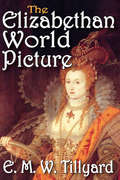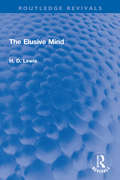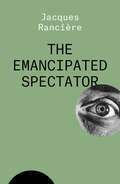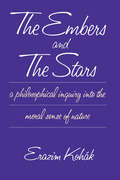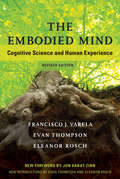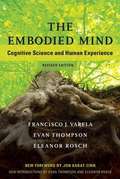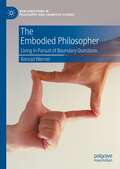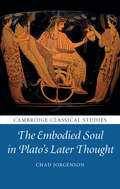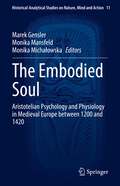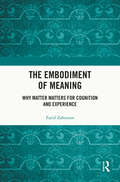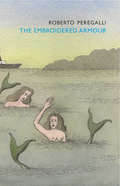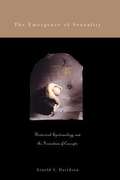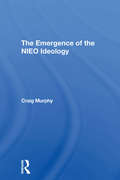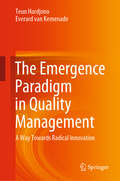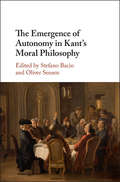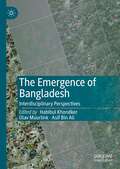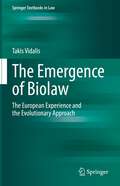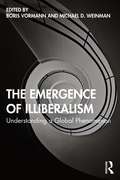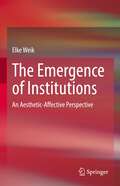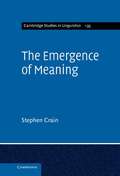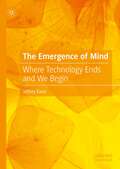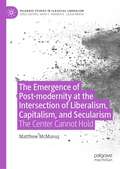- Table View
- List View
The Elizabethan World Picture
by E. M. W. TillyardThis illuminating account of ideas of world order prevalent in the Elizabethan Age and later is an indispensable companion for readers of the great writers of the sixteenth and seventeenth centuries Shakespeare and the Elizabethan dramatists, Donne and Milton, among many others. The basic medieval idea of an ordered Chain of Being is studied by Tillyard in the process of its various transformations by the dynamic spirit of the Renaissance. Among his topics are: Angels; the Stars and Fortune; the Analogy between Macrocosm and Microcosm; the Four Elements; the Four Humors; Sympathies; Correspondences; and the Cosmic Dance ideas and symbols that inspirited the imaginations not only of the Elizabethans, but also of the Renaissance as such.This idea of cosmic order was one of the genuine ruling ideas of the Elizabethan Age, and perhaps the most characteristic. Such ideas, like our everyday manners, are the least disputed and the least paraded in the creative literature of the time. The province of this book is some of the notions about the world and man that were quite frequently taken for granted by the ordinary educated Elizabethan; the commonplaces too familiar for the poets to make detailed use of, except in explicitly educational passages, but essential as basic assumptions and invaluable at moments of high passion.The objective of The Elizabethan World Picture is to extract and explain the most ordinary beliefs about the constitution of the world as pictured in the Elizabethan Age and through this exposition to help the ordinary reader to understand and to enjoy the great writers of the age. In attempting this, Tillyard has brought together a number of pieces of elementary lore. This classic text is a convenient factual aid to extant interpretations of some of Spenser, Donne, or Milton.
The Elusive Mind (Routledge Revivals)
by H. D. LewisFirst published in 1969, The Elusive Mind argues that the mental processes are of a quite different nature from physical ones and belong to an entity which is elusive in the sense that it can only be known, in the first instance, by each person in his own case in the course of having any kind of experience. This ‘elusive’ self is much involved with the body in any conditions we know, but it could also survive the dissolution of the body. The views of thinkers like Ryle, Hampshire, Malcolm, Feigl, and Ayer are subjected to an exceptionally close and critical scrutiny. In presenting these views, the author offers us the substance of the first series of Gifford Lectures he delivered in the University of Edinburgh; and, in what he says on such topics as dreaming; mysticism; and the ‘I-Thou’ relation and on Christian Theology. This book will be an essential read for scholars and researchers of philosophy, philosophy of mind, ethics, and religion.
The Elusiveness of the Ordinary: Studies in the Possibility of Philosophy
by Stanley Rosen"The concept of the ordinary, along with such cognates as everyday life, ordinary language, and ordinary experience, has come into special prominence in late modern philosophy. Thinkers have employed two opposing yet related responses to the notion of the ordinary: scientific and phenomenological approaches on the one hand, and on the other, more informal or even anti-scientific procedures. Eminent philosopher Stanley Rosen here presents the first comprehensive study of the main approaches to theoretical mastery of ordinary experience. He evaluates the responses of a wide range of modern and contemporary thinkers and grapples with the peculiar problem of the ordinary - how to define it in its own terms without transforming it into a technical (and so, extraordinary) artifact. "--BOOK JACKET. Title Summary field provided by Blackwell North America, Inc. All Rights Reserved
The Emancipated Spectator
by Jacques RanciereThe theorists of art and film commonly depict the modern audience as aesthetically and politically passive. In response, both artists and thinkers have sought to transform the spectator into an active agent and the spectacle into a communal performance.In this follow-up to the acclaimed The Future of the Image, Rancière takes a radically different approach to this attempted emancipation. First asking exactly what we mean by political art or the politics of art, he goes on to look at what the tradition of critical art, and the desire to insert art into life, has achieved. Has the militant critique of the consumption of images and commodities become, ironically, a sad affirmation of its omnipotence?From the Hardcover edition.
The Emancipatory Power of the Body in Everyday Life: Niches of Liberation
by Leszek KoczanowiczThe COVID-19 pandemic has powerfully highlighted the tight knot of bodiliness and politics. This relationship lies at the heart of this book. The author explores how events in everyday life take on a deeply political dimension, and how the body becomes a site of political practice. Subject to regulation, the body functions as a vehicle of oppressive social influences, and has been studied as such by philosophers within the framework of biopolitics. However, the body is also a locus of resistance and rebellion against the entrenched rules, a quality which the author refers to as somapower. The revolt of the body usually begins and develops beyond political spaces – in emancipatory cultural niches, which may gradually accrue political resonance. While this microphysics of emancipation, with its potential for remodeling political life, is particularly important in authoritarian and totalitarian regimes, it is also a relevant force in democracies, where it may foster social change.
The Embarrassment of Being Human: A Critical Essay on the New Materialisms and Modernity in an Age of Crisis
by Benjamin BoysenWith the message that everything in a sense is alive, thus allowing us to join forces with new politico-ethical communities stretching across human and nonhuman realms, the new materialisms have captivated the minds of many academics, artists, and intellectuals by stressing that it is time to return to a premodern mindset and discard modernity and its concepts of secularization, autonomy, and finitude.The Embarrassment of Being Human not only demonstrates how these magical materialisms are beset by grave theoretical and practical inconsistencies and self-contradictions. It also demonstrates how their demand for humans to step down and allow for an emancipation of things qualifies the new materialisms as a metaphysics of neoliberalism that reproduces and fortifies the self-contradictions rampant in the current neoliberal hegemony.While helping us to gain a comprehensive understanding of the tenets of the eerie ills of our epoch, the critique of the new materialisms can furthermore inspire us to appreciate how the exact inversion of the new materialist complex amounts to a revitalization of the modern project. A revitalization that is critical to think our epoch differently.
The Embers and the Stars: A Philosophical Inquiry into the Moral Sense of Nature
by Erazim Kohák"It is hard to put this profound book into a category. Despite the author's criticisms of Thoreau, it is more like Walden than any other book I have read. . . . The book makes great strides toward bringing the best insights from medieval philosophy and from contemporary environmental ethics together. Anyone interested in both of these areas must read this book."—Daniel A. Dombrowski, The Thomist "Those who share Kohák's concern to understand nature as other than a mere resource or matter in motion will find his temporally oriented interpretation of nature instructive. It is here in particular that Kohák turns moments of experience to account philosophically, turning what we habitually overlook or avoid into an opportunity and basis for self-knowledge. This is an impassioned attempt to see the vital order of nature and the moral order of our humanity as one."—Ethics
The Embodied Mind, revised edition: Cognitive Science and Human Experience (The\mit Press Ser.)
by Evan Thompson Francisco J. Varela Eleanor RoschA new edition of a classic work that originated the “embodied cognition” movement and was one of the first to link science and Buddhist practices.This classic book, first published in 1991, was one of the first to propose the “embodied cognition” approach in cognitive science. It pioneered the connections between phenomenology and science and between Buddhist practices and science—claims that have since become highly influential. Through this cross-fertilization of disparate fields of study, The Embodied Mind introduced a new form of cognitive science called “enaction,” in which both the environment and first person experience are aspects of embodiment. However, enactive embodiment is not the grasping of an independent, outside world by a brain, a mind, or a self; rather it is the bringing forth of an interdependent world in and through embodied action. Although enacted cognition lacks an absolute foundation, the book shows how that does not lead to either experiential or philosophical nihilism. Above all, the book's arguments were powered by the conviction that the sciences of mind must encompass lived human experience and the possibilities for transformation inherent in human experience. This revised edition includes substantive introductions by Evan Thompson and Eleanor Rosch that clarify central arguments of the work and discuss and evaluate subsequent research that has expanded on the themes of the book, including the renewed theoretical and practical interest in Buddhism and mindfulness. A preface by Jon Kabat-Zinn, the originator of the mindfulness-based stress reduction program, contextualizes the book and describes its influence on his life and work.
The Embodied Mind: Cognitive Science and Human Experience
by Jon Kabat-Zinn Evan Thompson Francisco J. Varela Eleanor RoschThis classic book, first published in 1991, was one of the first to propose the "embodied cognition" approach in cognitive science. It pioneered the connections between phenomenology and science and between Buddhist practices and science -- claims that have since become highly influential. Through this cross-fertilization of disparate fields of study, The Embodied Mind introduced a new form of cognitive science called "enaction," in which both the environment and first person experience are aspects of embodiment. However, enactive embodiment is not the grasping of an independent, outside world by a brain, a mind, or a self; rather it is the bringing forth of an interdependent world in and through embodied action. Although enacted cognition lacks an absolute foundation, the book shows how that does not lead to either experiential or philosophical nihilism. Above all, the book's arguments were powered by the conviction that the sciences of mind must encompass lived human experience and the possibilities for transformation inherent in human experience. This revised edition includes substantive introductions by Evan Thompson and Eleanor Rosch that clarify central arguments of the work and discuss and evaluate subsequent research that has expanded on the themes of the book, including the renewed theoretical and practical interest in Buddhism and mindfulness. A preface by Jon Kabat-Zinn, the originator of the mindfulness-based stress reduction program, contextualizes the book and describes its influence on his life and work.
The Embodied Philosopher: Living in Pursuit of Boundary Questions (New Directions in Philosophy and Cognitive Science)
by Konrad WernerThe book is the first formulation of a meta-philosophical scheme rooted in the embodied cognition paradigm. The latter views subjects capable of cognition and experience as living, embodied creatures coupled with their environments. On the other hand, the emergence of experimental philosophy has given rise to a new context in which philosophers have begun to search for a more thorough definition of philosophical competence. The time is ripe for these two trends to join their efforts. Therefore, the book discusses what it means for a human being thought of as a living subject to pursue philosophy. In this context, in contrast to the existing literature, philosophical competence must not be conflated with competence in philosophy. The former is a skill or attitude. The book refers to this peculiar attitude as the recognition of one’s epistemic position.
The Embodied Soul in Plato’s Later Thought (Cambridge Classical Studies)
by Chad JorgensonIn this book, Chad Jorgenson challenges the view that for Plato the good life is one of pure intellection, arguing that his last writings increasingly insist on the capacity of reason to impose measure on our emotions and pleasures. <P><P>Starting from an account of the ontological, epistemological, and physiological foundations of the tripartition of the soul, he traces the increasing sophistication of Plato's thinking about the nature of pleasure and pain and his developing interest in sciences bearing on physical reality. These theoretical shifts represent a movement away from a conception of human happiness as a purification or flight of the soul from the sensible to the intelligible, as in the Phaedo, towards a focus on the harmony of the individual as a psychosomatic whole under the hegemonic power of reason.<P> Proposes a new interpretation of Platonic dualism.<P> Organised thematically, rather than by dialogue.<P> Situates Plato's arguments in their cultural context.
The Embodied Soul: Aristotelian Psychology and Physiology in Medieval Europe between 1200 and 1420 (Historical-Analytical Studies on Nature, Mind and Action #11)
by Marek Gensler Monika Mansfeld Monika MichałowskaThis book contains a collection of papers devoted to the problems of body, mind and soul in medieval Europe between 1200 and 1420. Modern discussions of the mind-body relationship seldom look back into the past further than the psycho-somatic dualism of Descartes which started the mechanistic approach in biology and medicine. The authors of the volume go beyond that fault line to investigate the tradition of medieval natural philosophy and its ancient sources and analyze the issues forming a borderland between physiology and psychology. They also demonstrate that the medieval tradition was rich and diverse for it offered a wide variety of the discussed problems as well as the methodological approaches. This volume is the first attempt to cover a diversity of topics and methods employed in the medieval debates on body, mind and soul as well as their interrelationships. The Embodied Soul is a must-have for all those interested in puzzling dilemmas of how a living organism functions and how its inner life can be explained as well as for all those interested in the history of thought in general.Chapter 14 is available open access under a Creative Commons Attribution 4.0 International License via link.springer.com.
The Embodiment of Meaning: Why Matter Matters for Cognition and Experience
by Farid ZahnounThis book presents an elaborated argument for why functionalism, as well as other dematerialized and disembodied theories of mind, can’t be right. In discussing the question of whether or not we are just material beings, Hilary Putnam once claimed that “we could be made of Swiss cheese and it wouldn't matter.” Fifty years later, functionalism still reigns, and the psychological irrelevance of the materiality of our bodies remains a hardwired assumption of philosophy of mind and cognitive science. As this book shows, the idea of the possibility of a disembodied mind is rooted in a philosophical depreciation of the particular in favor of the abstract, an attitude which runs through Western philosophy as a red thread. The Embodiment of Meaning demonstrates how this privileging of the immaterial-abstract over the material-particular is not only untenable from a logical-philosophical point of view; it also runs counter to a basic fact of human psychology itself: rather than being irrelevant, the world precisely matters most in its material particularity. In addition to offering a thoroughgoing criticism of the Platonic-functionalist “abstract-over-particular” idea, the book aims to substantially contribute to a less ambiguous understanding of the various ways in which “matter matters.”
The Embroidered Armour
by Shaun Whiteside Roberto PeregalliThe Embroidered Armour examines the Greek Mysteries, mythology and legends that heralded a revolution in thinking between the time of Homer and Plato, which gave birth to the Western cultural tradition.From the Trade Paperback edition.
The Emergence Of Sexuality: Historical Epistemology And The Formation Of Concepts
by Arnold I. DavidsonThe essays that constitute this book were written, more or less independently of one another, over many years. All of them were first given as lectures, and are marked by the occasions of their presentation. I have not tried to erase their oral quality, nor have I excised a small number of repetitions that appear in related essays.
The Emergence Of The Nieo Ideology
by Craig MurphyThis study traces the political history of the ideas underlying Third World calls for a New International Economic Order. Filling a significant gap in the literature, the book shows that NIEO ideology has a direct, unbroken line of development extending back to World War II, when a "new international economic order," the Bretton Woods system, was created. Dr. Murphy maintains that NIEO ideology is not rooted only in Third World acceptance of Prebisch's views on trade; rather, it evolved from Third World attempts to cope with problems and opportunities that emerged as the Bretton Woods system was created, operated, and began to break down. By the 1970s, the ideology had become a complex and coherent analysis of the economic position of Third World states, including a political analysis of how Third World views could be made dominant. Many of Dr. Murphy's conclusions challenge the conventional wisdom about the Third World position of the NIEO. In addition, his study offers insight into the relatively unexplored area of how changes in political and social consciousness affect international systems, and provides grounds on which officials from both the South and the North can see the others' views as less alien.
The Emergence Paradigm in Quality Management: A Way Towards Radical Innovation
by Teun Hardjono Everard van KemenadeThis book is focused on quality management, and four different lenses which can be used to explore the phenomenon. It introduces emergence as a paradigm in thinking about quality, and explores conditions which are beneficial to radical innovation. The Emergence Paradigm in Quality Management provides an overview of the existing movements in thinking about quality, and discusses why these movements in fact represent paradigms. Three paradigms, the Empirical Paradigm, the Reference Paradigm and the Reflective Paradigm, are explained followed by a search for the Fourth Paradigm, the so-called Emergence Paradigm, which presents a route to radical innovation in organizations when plans, strategies and models fail. It presents the debates around the paradigms, and explores which is the best approach. This professional text will be ideal for strategy and policy makers wanting to establish a link between their conceived plans and the attention for quality, while finding ways to facilitate innovation. Professionals in a range of for-profit and non-profit organizations, including healthcare, will be able to expand their knowledge on quality management, operations management, and organizational studies.
The Emergence of Autonomy in Kant's Moral Philosophy
by Oliver Sensen Stefano BacinAutonomy is one of the central concepts of contemporary moral thought, and Kant is often credited with being the inventor of individual moral autonomy. But how and why did Kant develop this notion? The Emergence of Autonomy in Kant's Moral Philosophy is the first essay collection exclusively devoted to this topic. It traces the emergence of autonomy from Kant's earliest writings to the changes that he made to the concept in his mature works. The essays offer a close historical and philosophical analysis of what prompted Kant to develop his conception of autonomy, charting the historical background which prompted his search, and thoroughly analysing different stages of his writings in order to see which element of autonomy was introduced at which point. The resulting volume will be of interest to both scholars and students of Kantian moral philosophy, as well as to anyone interested in the subject of autonomy.
The Emergence of Bangladesh: Interdisciplinary Perspectives
by Habibul Khondker Olav Muurlink Asif Bin AliThe Emergence of Bangladesh analyses and celebrates the first 50 years of Bangladesh as a nation, bringing insights from key scholars in Bangladeshi studies to an international audience, as well as ‘bringing home’ to a domestic audience the work of some of the nation’s greatest intellectual exports, the Bangladeshi scholars who have made a mark in their field of study in academia. The book offers unique coverage of the battlegrounds on which the founding of the new nation was fought, including language, power and religion, and provides unique insight into some of the hot spots that continue to shape the development of the nation: the issues of gender, culture, ethnicity, governance, the economy and the army. Those with an interest in understanding the past or present Bangladesh will find this a trove of frank and readable analysis.
The Emergence of Biolaw: The European Experience and the Evolutionary Approach (Springer Textbooks in Law)
by Takis VidalisThis book introduces “biolaw” as an integrated and distinct field in contemporary legal studies. Corresponding to the legal dimension of bioethics, the term “biolaw” is already in use in academic and research activities to denote legal issues emerging mostly from advanced technological applications. This book is a genuine attempt to rationalize the field of biolaw after almost four decades of continuous production of relevant legislation and judgments worldwide. This experience is a robust basis for defending a) a separate legal object, covering the total of legal norms that govern the management of life as a natural phenomenon in all its possible forms, and b) an “evolutionary” approach that opens the discussion on a future conciliation of legal regulation with the Theory of Evolution on the ground of biolaw.
The Emergence of Illiberalism: Understanding a Global Phenomenon
by Boris VormannAs illiberal and authoritarian trends are on the rise—both in fragile and seemingly robust democracies—there is growing concern about the longevity of liberalism and democracy. The purpose of this volume is to draw on the analytical resources of various disciplines and public policy approaches to reflect on the current standing of liberal democracy. Leading social scientists from different disciplinary backgrounds aim to examine the ideological and structural roots of the current crisis of liberal democracies, in the West and beyond, conceptually and empirically. The volume is divided into two main parts: Part I explores tensions between liberalism and democracy in a longer-term, historical perspective to explain immanent vulnerabilities of liberal democracy. Authors examine the conceptual foundations of Western liberal democracy that have shaped its standing in the contemporary world. What lies at the core of illiberal tendencies? Part II explores case studies from the North Atlantic, Eastern Europe, Turkey, India, Japan, and Brazil, raising questions whether democratic crises, manifested in the rise of populist movements in and beyond the Western context, differ in kind or only in degree. How can we explain the current popular appeal of authoritarian governments and illiberal ideas? The Emergence of Illiberalism will be of great interest to teachers and students of politics, sociology, political theory and comparative government.
The Emergence of Institutions: An Aesthetic-Affective Perspective
by Elke WeikThis book presents an experiential, aesthetic-affective approach to the study of institutions. Drawing on institutional sociology, hermeneutics, phenomenology and process philosophy, it conceptualises institutions as collective experiences with their own self-promoting and self-propelling powers. Instead of seeing institutional emergence, change and decline as the result of actors’ interests and manipulations, this book re-establishes the importance of factors beyond human design and intervention. Drawing on process theory, it shows how ideas, norms and values can form self-stabilising configurations that affect people without conscious realisation. It complements current thinking about institutions by showing how institutions constitute people long before people constitute them. With the help of authors as diverse as Antonio Damasio, A.N. Whitehead, J.W. von Goethe and Max Weber, Elke Weik crafts a perspective that allows us to understand institutions as aesthetic and affective powers in their own right. This book is for researchers interested in process theory, institutional and organisational studies, hermeneutics, and aesthetics.
The Emergence of Meaning
by Stephen CrainOver the past forty years, scientists have developed models of human reasoning based on the principle that human languages and classical logic involve fundamentally different concepts and different methods of interpretation. In The Emergence of Meaning Stephen Crain challenges this view, arguing that a common logical nativism underpins human language and logical reasoning. The approach which Crain takes is twofold. Firstly, he uncovers the underlying meanings of logical expressions and logical principles that appear in typologically different languages – English and Mandarin Chinese – and he demonstrates that these meanings and principles directly correspond to the expressions and structures of classical logic. Secondly he reports the findings of new experimental studies which investigate how children acquire the logical concepts of these languages. A step-by-step introduction to logic and a comprehensive review of the literature on child language acquisition make this work accessible to those unfamiliar with either field.
The Emergence of Mind: Where Technology Ends and We Begin
by Jeffrey KaneWhile it may appear that generative AI has mastered the mystery of the human mind and released its full power, The Emergence of Mind: Where Technology Ends and We Begin demonstrates the profound and fundamental limitations of the technology and its use as a model of human thinking. In response, the book offers an emergent model of the human mind rooted in our experiences as living, sentient, social and conscious beings. The text explores the nature of meaning in human cognition and the critical importance of the experience of ideas. In so doing, it offers insights into the cultivation of specific generative capacities of the human mind.
The Emergence of Post-modernity at the Intersection of Liberalism, Capitalism, and Secularism: The Center Cannot Hold (Palgrave Studies in Classical Liberalism)
by Matthew McManusThis book is a systematic and thorough analysis of what post-modernity is and how it emerged. It distinguishes between those who regard post-modernity as a theoretical approach and those who regard it as a culture, and argues that interpreting post-modernity as a culture is more fruitful. It discusses the three factors which led to its emergence, namely liberalism, capitalism, and secularism, highlighting their respective influence in generating the culture of post-modernity within neoliberal societies. The volume provides a lengthy analysis of neoliberal post-modernity in practice, arguing that post-modernism is the cultural condition of neoliberal societies in the late 20th and early 21st centuries. Until recently it seemed that neoliberal post-modernity was here to stay, framed by relationship to freedom and time which stressed individual agency but precluded the possibility of historical change at the political level. However, the Great Recession of 2008 opened new spaces for agitation and transformation which has resulted in the discordant politics of the last decade. This book will be of interest to scholars working in a number of fields, including economic policy, cultural analysis, political theory, and social critique.
